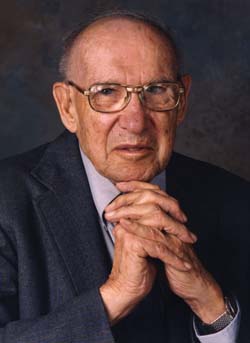Management guru Peter F. Drucker died November 11, 2005 at age 95
Los Angeles, CA, November 13, 2005 -- Management guru Peter F. Drucker died on Friday November 11, 2005 at his home in Claremont, California. He was 95.
 Drucker was a writer, teacher, and consultant specializing in strategy and policy for businesses and social sector organizations. For more than 60 years, Drucker challenged people's thinking
about organizations and popularised the notion of the "post-industrial
knowledge worker".
Drucker was a writer, teacher, and consultant specializing in strategy and policy for businesses and social sector organizations. For more than 60 years, Drucker challenged people's thinking
about organizations and popularised the notion of the "post-industrial
knowledge worker".
Drucker was born in 1909 in Vienna and was educated there and in England. He took his doctorate in public and international law while working as a newspaper reporter in Frankfurt, Germany. He then worked as an economist for an international bank in London. Drucker came to the United States in 1937. He began his teaching career as professor of politics and philosophy at Bennington College; for more than twenty years he was professor of management at the Graduate Business School of New York University. The recipient of many awards and honorary degrees, Peter Drucker was Marie Rankin Clarke Professor of Social Sciences at Claremont Graduate University. Its Graduate Management School was named after him in 1984.
Marketing Professor Philip Kotler noted "Peter Drucker is the Father of Management. For many of us, he is our role model, continually generating new ideas and refining old ones."
"Peter could look around corners", philanthropist Eli Broad, who knew Drucker for 30 years, said. "He would say things that seemed rather simple but in fact were very profound. He saw the future."
Former General Electric chairman Jack Welch credited a pithy question from Drucker with helping him understand how to restructure the far-flung GE empire, a sometimes-wrenching process that turned the company into a stock-market dynamo and made Welch one of Americas most celebrated managers.
Drucker said: "If you weren't already in this business, would you enter it today? And if not, what are you going to do about it?" Welch recalled. "Simple, right? But incredibly powerful." Drucker's simple question ultimately led to Welch's operating maxim that if a GE unit could not be No. 1 or No. 2 in its field, it should be jettisoned.
Claremont Graduate University said Drucker died of natural causes. He was the Marie Rankin Clarke professor of social sciences and management at Claremont from 1971 to 2003, and he continued to write from the campus until his death.
Drucker was often called the father of modern management. But on the occasion of his 90th birthday, he described his life work much more simply: "I looked at people, not at machines or buildings," he said. That approach led to nearly three dozen books and thousands of articles that form nothing less than a guide to the 20th century economy.
The former newspaperman did not think up economic theories or elaborate systems of business operation. Rather, he looked at people working, put them in historical context and saw a new liberal art: management. "Unlike many philosophers, he spoke in plain language," Intel Corp. founder Andy Grove said in a statement.
General Motors, which invited Drucker to study its corporate structure in 1943, provided his laboratory and his epiphany. At GM in wartime, Drucker found the corporation "as human effort with people of diverse skills and knowledge working together in a large organisation," he wrote in Concept of the Corporation, the 1946 book that emerged from his two years studying GM.
"It was something new in world history, different from the command and controlc methods of organising labor that had characterised the building of the Pyramids or Napoleons army or even Henry Ford's assembly line. The overseer of the unskilled peasants who dragged stone for the Pyramids did not concern himself with morale or motivation," Drucker wrote.
But modern management is different, he said. "Its task is to make people capable of joint performance, to make their strengths effective and their weaknesses irrelevant," he said in various ways in his 18 books on the profession of management.
Drucker is survived by his wife, Doris, and their four children and six grandchildren.
compiled from various online sources including http://www.pfdf.org and http://www.detnews.com/2005/obituaries/0511/12/obits-379839.htm